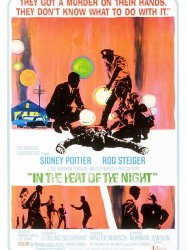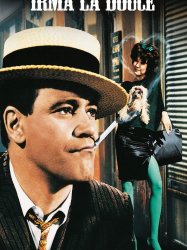Mirisch Company

If you like this company, let us know!
La Mirisch Company (connue aussi sous les noms de Mirisch Pictures, Inc., Mirisch Corporation et Mirisch Production Company), fondée par Walter Mirisch et ses frères Marvin Mirisch et Harold Mirisch en 1957, est une société de production de cinéma américaine.
Walter Mirisch commence sa carrière de producteur chez Monogram Pictures avec Fall Guy (1947) et les serials des Bomba.
Les frères Mirisch contrôlent la production de Allied Artists, filiale de Monogram, créée en 1946, où ils engagent sous contrat John Huston, William Wyler et Billy Wilder. Ces deux derniers livrent, respectivement, La Loi du Seigneur et Ariane, qui sont des succès critiques mais pas publics.
La Mirisch Company est créée en août 1957. Un mois plus tard, elle signe un contrat de 12 films avec United Artists (UA), lequel est étendu à 20 films en 1959. En 1963, un nouveau contrat de 20 films est signé et UA acquiert la Mirisch Company. Les frères Mirisch conservent leurs postes à la compagnie et continuent de louer leurs bureaux au Samuel Goldwyn Studio.
En 1964 est créée Mirisch Films Ltd au Royaume-Uni, laquelle produit une poignée de films, dont Quand l'inspecteur s'emmêle.
Fonctionnant comme une société de portage salarial, la Mirisch Company produit 58 films pour United Artists, commençant avec Fort Massacre (1958) et se poursuivant avec Certains l'aiment chaud (1959) , Les Cavaliers, La Garçonnière, Les Sept Mercenaires (1960), West Side Story (1961), La Panthère rose, La Grande Évasion (1963), Dans la chaleur de la nuit (1967) et se terminant avec Mr. Majestyk en 1974. À partir de cette date, la Mirisch Company ne produit plus qu'une poignée de films, essentiellement pour Universal Pictures.
Sous la bannière Mirisch-Geoffrey-DePatie-Freleng, la Mirisch produit de 1964 à 1980 la série de dessins animés La Panthère rose, toujours distribuée en salles par UA.
À la télévision, la Mirisch n'arrive pas à placer le pilote d'une série dérivée de Certains l'aiment chaud en 1961, mais a plus de succès avec Les Rats du désert, produit avec Lee Rich en 1966 pour ABC et Les Sept Mercenaires en 1998 pour CBS.
Best films
Filmography of Mirisch Company (54 films)
Production

Dracula (1979)
, 1h49Directed by John Badham
Origin United-kingdom
Genres Drama, Horror, Romance
Themes Films about magic and magicians, Théâtre, Dracula films, Vampires in film, Films based on plays
Actors Frank Langella, Laurence Olivier, Donald Pleasence, Kate Nelligan, Sylvester McCoy, Trevor Eve
In Whitby, England in 1913, Count Dracula (Frank Langella) arrives from Transylvania via the ship Demeter one stormy night. A sickly Mina Van Helsing (Jan Francis), who is visiting her friend Lucy Seward (Kate Nelligan), discovers Dracula's body after his ship has run aground. The Count visits Mina and her friends at the household of Lucy's father, Dr. Jack Seward (Donald Pleasence), whose clifftop mansion also serves as the local asylum. At dinner, he proves to be a charming guest and leaves a strong impression on the hosts, Lucy especially. Less charmed by this handsome Romanian count is Jonathan Harker (Trevor Eve), Lucy's fiancé.
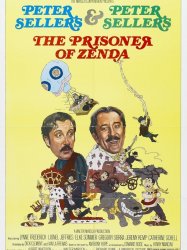
The Prisoner of Zenda (1979)
, 1h48Directed by Richard Quiney
Origin USA
Genres Comedy, Action, Adventure
Themes Monde imaginaire, Politique, Political films, Films about royalty
Actors Peter Sellers, Lynne Frederick, Lionel Jeffries, Stuart Wilson, Britt Ekland, Elke Sommer
King Rudolf IV (Sellers) dies in a balloon accident upon the celebration of his seventieth birthday. In order to secure the throne, General Sapt and his nephew Fritz travel to London, where the King's son, Rudolf V (Sellers), resides and lives through the day in London's pleasure establishments; but the King's demented half-brother Michael (Kemp), thinking that he is the better claimant, sends an assassin after them. Hansom cab driver Sydney (or Sidney) Frewin (Sellers), the new King's half-brother from an affair with a British actress, rescues Rudolf from an assassination attempt. Once his resemblance to the King is noticed, Frewin is hired by the general ostensibly as the King's coachman, but actually to play the role of decoy. The ruse is quickly uncovered, however, when during an attack by Michael's men the royal guardsmen address Frewin as their new king, and the two look-alikes get acquainted.
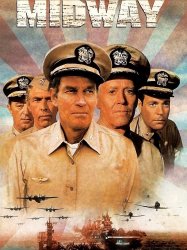
Midway (1976)
, 2h12Directed by Jack Smight
Origin USA
Genres Drama, War, Action, Adventure, Historical
Themes Seafaring films, Transport films, Aviation films, Political films, United States Armed Forces in films
Actors Charlton Heston, Henry Fonda, James Coburn, Glenn Ford, Hal Holbrook, Toshiro Mifune
The film chronicles the Battle of Midway, a turning point in World War II in the Pacific. The Imperial Japanese Navy had been undefeated until that time and out-numbered the American naval forces by four to one.

Mr. Majestyk (1974)
, 1h43Directed by Richard Fleischer, Paul Baxley
Origin USA
Genres Thriller, Action, Adventure, Crime
Themes Prison films
Actors Charles Bronson, Al Lettieri, Linda Cristal, Lee Purcell, Paul Koslo, Frank Maxwell
Vince Majestyk (Charles Bronson) is a farmer, a former U. S. Army Ranger instructor and Vietnam War veteran, who owns and operates a watermelon farm in rural Colorado. He needs to harvest his crop in order to keep the farm financially solvent.

Avanti! (1972)
, 2h20Directed by Billy Wilder
Origin USA
Genres Drama, Comedy, Romantic comedy, Romance
Themes Théâtre, Films based on plays
Actors Jack Lemmon, Juliet Mills, Clive Revill, Edward Andrews, Gianfranco Barra, Janet Ågren
For the past ten years, Baltimore industrialist Wendell Armbruster, Sr. has been spending a month at the Grand Hotel Excelsior in Ischia, allegedly to soak in the therapeutic mud baths for which the resort island is known. When he is killed in an automobile accident, his straitlaced son Wendell Armbruster, Jr. journeys to Italy to claim his father's body. Upon arrival he discovers his father was not alone in the Fiat he was driving; with him was his British mistress, whose daughter, free-spirited London shop girl Pamela Piggott, also is on the scene, though she clearly knew of their parents' clandestine romance beforehand. Hotel manager Carlo Carlucci attempts to smooth things over, taking on all the arrangements for the body to be taken back to Baltimore in time for burial in just three days time.

The Magnificent Seven Ride! (1972)
, 1h40Directed by George McCowan
Origin USA
Genres Action, Western
Actors Lee Van Cleef, Stefanie Powers, Michael Callan, Luke Askew, Ralph Waite, Mariette Hartley
In southern Arizona territory, former hired gun-turned-marshal Chris Adams rescues his old friend, former bounty hunter Jim Mackay from an ambush. After recovering from his long ride across the desert, Jim asks Chris to help him defend the small Mexican border town of Magdalena, which has come under constant attack by bandit De Toro and his men. Having recently married and assumed his job as marshal, however, Chris is reluctant to assist Jim, despite their long friendship.
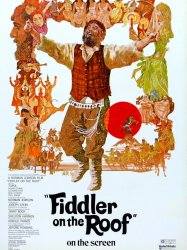
Fiddler on the Roof (1971)
, 2h52Directed by Norman Jewison
Origin USA
Genres Drama, Comedy-drama, Musical, Romance
Themes Dance films, Films about music and musicians, Films about religion, Théâtre, Musical films, Films about Jews and Judaism, Films based on plays, Films based on musicals
Actors Chaim Topol, Norma Crane, Leonard Frey, Molly Picon, Paul Mann, Paul Michael Glaser
In 1905, Tevye, a poor Jewish milkman living in the Russian village of Anatevka, explains to the audience what keeps the Jews of Anatevka going is the balance they achieve through following their ancient traditions, comparing their precarious circumstance to a fiddler on a roof: trying to scratch out a pleasant tune, while not breaking their necks. The fiddler appears throughout the film as a metaphoric reminder of the Jews' ever-present fears and danger, and also as a symbol of the traditions Tevye is trying to hold on to as his world changes around him. While in town, Tevye meets Perchik, a radical Marxist from Kiev. Tevye invites Perchik to stay with him and his family, and as a deal, offers him food, in exchange for Perchik tutoring his daughters.

The Hawaiians (1970)
, 2h14Directed by Tom Gries
Origin USA
Genres Drama, Adventure, Romance
Themes Seafaring films, Transport films
Actors Charlton Heston, Geraldine Chaplin, Mako Iwamatsu, Bette Midler, John Phillip Law, Alec McCowen
The story begins forty years after the events depicted in the original Hawaii, as a new generation of Americans and Asians must deal with a changing island and world; one of them is a sea captain.

Halls of Anger (1970)
, 1h36Directed by Paul Bogart
Origin USA
Genres Drama
Themes Films about education
Actors Calvin Lockhart, Jeff Bridges, Janet MacLachlan, Edward Asnere, Rob Reiner, Ta-Tanisha
A predominantly black high school is integrated by white students and trouble follows.

The Landlord (1970)
, 1h52Directed by Hal Ashby
Origin USA
Genres Drama, Comedy, Comedy-drama, Romantic comedy
Actors Beau Bridges, Lee Grant, Diana Sands, Pearl Bailey, Louis Gossett Jr., Walter Brooke
Elgar Enders (Beau Bridges), a man who lives off his parents' wealth, buys himself an inner-city tenement, in the transitional neighborhood of 1970 Park Slope, Brooklyn, planning to evict all the occupants and construct a luxury home for himself. However, once he ventures into the tenement, he gradually grows fond of the low-income black residents who dwell there. Enders decides to remain as the landlord, and help fix the apartment building. He rebels against his WASP upbringing, and to his parents' dismay, he romances two black women.
 , 2h5
, 2h5Directed by Billy Wilder
Origin USA
Genres Thriller, Comedy, Adventure, Historical, Crime, Romance
Themes Films about sexuality, LGBT-related films, Sherlock Holmes films, Political films, Buddy films, LGBT-related films, Films about royalty, LGBT-related film
Actors Robert Stephens, Geneviève Page, Colin Blakely, Christopher Lee, Clive Revill, Irene Handl
The film is divided into two separate, unequal stories. In the shorter of the two, Holmes is approached by a famous Russian ballerina, Madame Petrova (Tamara Toumanova), who proposes that they conceive a child together, one who she hopes will inherit her physique and his intellect. Holmes manages to extricate himself by claiming that Watson is his lover, much to the doctor's embarrassment.
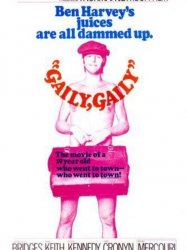
Gaily, Gaily (1969)
, 1h47Directed by Norman Jewison
Origin USA
Genres Comedy
Themes Films about writers, Films about journalists
Actors Beau Bridges, Melina Mercouri, Brian Keith, George Kennedy, Hume Cronyn, Margot Kidder
Set in 1910, the film's main character is Ben Harvey (patterned after Ben Hecht): serious about seeing the world, he leaves his home for Chicago, where he meets a woman named Lil, who in reality is the Madam of the bordello Ben mistakes for a boarding house. He also is friends with Adeline, one of the prostitutes. While he tries to find work, Ben encounters other people, including a man named Sullivan, who is involved in shady doings in city government. Suspecting corruption, Harvey and a hard drinking reporter decide to investigate.

Some Kind of a Nut (1969)
, 1h30Directed by Garson Kanin, Walter Mirisch
Origin USA
Genres Comedy
Actors Dick Van Dyke, Angie Dickinson, Rosemary Forsyth, Elliott Reid, Zohra Lampert, Pippa Scott
Fred Amidon is a New York City bank teller whose wife Rachel is divorcing him. Fred already has a new fiancee, bank colleague Pamela Anders, with whom he is about to embark on a vacation.
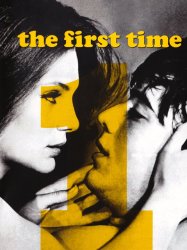
The First Time (1969)
, 1h30Directed by James Neilson
Origin USA
Genres Comedy
Themes Films about sexuality, Erotic films, Films about virginity
Actors Jacqueline Bisset, Sharon Acker, Trudy Young, Ricky Kelman, Gerard Parkes, Cosette Lee

The Thomas Crown Affair (1968)
, 1h42Directed by Norman Jewison, Walter Hill
Origin USA
Genres Drama, Thriller, Action, Crime, Romance
Themes Heist films, Gangster films, Escroquerie
Actors Steve McQueen, Faye Dunaway, Paul Burke, Jack Weston, Gordon Pinsent, Addison Powell
Millionaire businessman-sportsman Thomas Crown (Steve McQueen) pulls off a perfect crime by orchestrating four men to rob $2,660,527.62 from a Boston bank, along with a fifth man who drives the getaway Ford station wagon with the money and dumps it in a cemetery trash can. None of the men ever meets Crown face-to-face, nor do they know or meet each other before the robbery. Crown retrieves the money from the trash can personally after secretly following the driver of the station wagon, then personally deposits the money into an anonymous Swiss bank account in Geneva, making several trips, never depositing the money all at once so as to not draw undue attention to his actions.
 Connection
Connection


